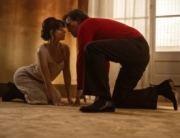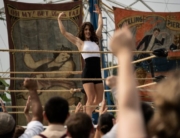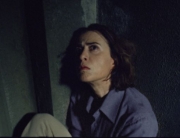Hopefully, it is not giving too much away to quote from the Viscount Halifax. Born Edward Wood, the British foreign secretary and political rival to then-prime minister Winston Churchill sits stone-faced in the House of Commons and says to himself, with begrudging admiration, that Churchill “mobilized the English language and sent it into battle.”
That clever quip could serve as the tagline for Joe Wright’s reverential, respectful, and rousing biopic of Churchill at a turning point in World War II, when Great Britain faced limited military options: to fight Hitler or agree to peace negotiations brokered by Italy. In May 1940, the Third Reich’s Army had been sweeping through the Netherlands and Belgium, and France was about to fall to the Germans any day. The British had one fighting force in Calais and 300,000 Allied troops trapped at the port city of Dunkirk, waiting to retreat. (French viewers may have the most cause to wince; its military leaders are portrayed as insouciant and resigned to German domination.)
It goes without saying that the film offers a backstory to Christopher Nolan’s blockbuster Dunkirk. Joe Wright’s Darkest Hour, however, offers visceral reactions of a different sort. Instead of bombs, gunfire, fast-cut editing, or cliff-hangers, the bombast is made of words. The script emphasizes the art of rhetoric. Nevertheless, the dialogue takes a back bench to the outsized personality of Churchill, up against the fading dapper elegance of Neville Chamberlain (Ronald Pickup) and the steely-eyed Halifax (Stephen Dillane).
The audience’s entry into the political ping-pong is through Churchill’s new secretary, Miss Layton, played with a quiet and appealing self-effacement by Lily James, rightly the British go-to ingénue of the moment. The role is not much different from her turn as a maid to Emperor Wilhelm of Germany in The Exception, set during exactly the same period of time when Germany took over Holland. In the new film, James’s character is an observer (and not a spyas before).
Truly a political film, Darkest Hour aims to fulfill the needs of its constituents. For History Channel devotees, there’s an opening compilation of newsreel footage, beginning with Nazi soldiers in formation. With a straightforward, articulate script by Anthony McCarten and expertly cast (including Kirstin Scott Thomas as Clemmie Churchill and Samuel West as Sir Anthony Eden), it recalls the best of BBC’s period dramas for PBS viewers, albeit with a more ornate sheen. Though beautifully composed for the big screen, the cinematography does call attention to itself. Much of the backroom politicking takes place in hazily-lit rooms (maybe it’s from the cigar smoke), where a mere beam of light pierces the darkness.
The new film is certainly better than The King’s Speech, which, in retrospect, looks more and more like a by-the-numbers low-budget biopic. In some ways, the portrayal of King George VI (Ben Mendelsohn) in Wright’s version is more complex and savvier, with a more solid backbone than the version in The King’s Speech. By far, the stakes are exponentially higher.
This new film also nearly outshines Netflix’s The Crown in palatial sumptuousness. In fact, it’s that television series that may be Darkest Hour‘s most formidable challenger. As the jowly prime minister, John Lithgow is closer to Churchill’s actual age at the time and appears with minimal makeup. Without the obvious use of body padding, his performance relies more on a stooped back and mannerism (the hand on hip, the ever-present cigar) to suggest the elder statement’s physicality. That’s not to say that Gary Oldman, as Churchill, is buried under prosthetics or padding. He makes for a convincing Churchill, but Lithgow wears the role more easily, and more freely. (Oldman, speaking with more nasality and at a higher pitch, sounds a bit like Frank Morgan in The Wizard of Oz.)
Still, the film at its most successful convinces the viewer that the fate of the Western world is unknown, that history could have taken a more pragmatic turn, even though this historical time period has been well rehashed many times this year alone—let’s not forget The Finest Hours or Brian Cox’s turn in Churchill. No matter how many times you have heard or read Churchill’s “Blood, Sweat, and Tears” or the “We Shall Fight on the Beaches” speeches to Parliament, they will feel spontaneous and fresh. Context is everything.

















Leave A Comment